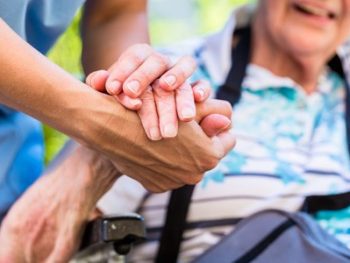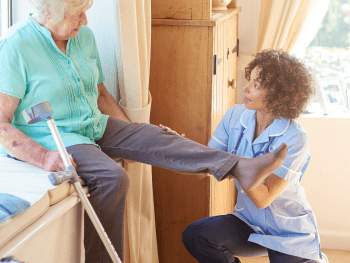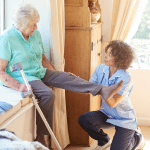March is National Social Worker Appreciation Month
As the nation’s baby boomer generation reaches retirement age and life expectancy increases, the need for support care for individuals with an advanced illness grows more urgent. March is National Social Worker Appreciation month and we want to explain the importance of our palliative and hospice social workers and thank them for their compassionate work.
As someone approaches their end-of-life, Pemi-Baker Hospice & Home Health’s social workers address issues related to the patient, family, caregivers, and the team of health care professionals involved in providing the care.
Patients who require palliative and/or hospice care can experience extreme challenges, including depression, anger, and anxiety; intense physical pain or discomfort; financial strain; social isolation; and family conflict. This phase of life often carries the added emotional weight of grief and bereavement and frequently involves pain management.
For these reasons, the participation of palliative/hospice social workers is critically important to guide patients and families in navigating the many challenges and pitfalls as well as to identify opportunities to help them with the difficult process of end-of-life planning; manage the mental, emotional, familial, and monetary stressors of debilitating physical illness; understand patients’ treatment plans and voice their needs; overcome crisis situations; and connect to other support services in the area.
These specially trained professionals are advocates for patients and their families and bring depth of knowledge about available resources, whether the palliative/hospice services are delivered in a hospital setting or at home.
Palliative/hospice social workers must be flexible because every situation is unique; they must quickly adjust to each new environment. They play a key role in providing insight and preparing other members of the patient’s team of health care professionals. They’re also guides for advanced care planning (end of life wishes).
“Because it’s performed in a stressful time of life for everyone involved, palliative/hospice social work can be challenging, but the rewards include the opportunity to make a deep connection with individuals, to celebrate their life stories, and to have a significantly positive impact on patients and their families,” said Nancy Waugh, BSW for Pemi-Baker Hospice & Home Health.
Differences between Hospice and Palliative Care
The goal of end-of-life care is to improve the physical, psychosocial, and spiritual quality of life of people living with a serious illness and their families.
Palliative care is designed to prevent or relieve pain, whether physical, psychosocial, or spiritual, and alleviate any symptoms of the illness. It can be provided at any point during the illness and be used alongside curative care.
In contrast, hospice is a form of palliative care that supports and provides physical comfort at the end of life—typically when life expectancy is six months or less.
While some people may use palliative care and subsequently enroll in hospice care, others begin hospice without prior use of palliative care or may choose palliative care at the end of life instead of hospice. For more information on Pemi-Baker’s Palliative and/or Hospice services please call or visit our website: www.pbhha.org
Pemi-Baker Hospice & Home Health is a trusted, nonprofit agency proudly serving 29 towns in central and northern NH since 1967. Expert services include at-home healthcare and physical therapies (VNA), hospice and palliative care, and community programs including: American Red Cross CPR/AED/FA, Caregiver and Bereavement Support Groups and Ask A Pemi-Baker Nurse days at your local senior centers. Providing compassionate care with experienced staff who are trained, certified professionals and also your neighbors. In your time of need, we’re right where you need us.
Pemi-Baker is located at 101 Boulder Point Drive, Suite 3, Plymouth, NH. To contact us please call: 603-536-2232 or email: info@pbhha.org Like our Facebook Page: @pemibakerhospicehomehealth
~Written by Anna Swanson










 Contact Anna Swanson by phone or email today and become better prepared to save a life!
Contact Anna Swanson by phone or email today and become better prepared to save a life!
 Offered by Pemi-Baker Hospice & Home Health and Plymouth Regional Senior Center.
Offered by Pemi-Baker Hospice & Home Health and Plymouth Regional Senior Center. You must pre-register by Wednesday, February 7, 2023, in order to attend so that we know how many to prepare for. The groups will be facilitated by Guy Tillson, Pemi-Baker’s Bereavement Coordinator. You may contact him by email:
You must pre-register by Wednesday, February 7, 2023, in order to attend so that we know how many to prepare for. The groups will be facilitated by Guy Tillson, Pemi-Baker’s Bereavement Coordinator. You may contact him by email: 

 A New Year is the perfect time to kick-start a new beginning and finally achieve the things you’ve always wanted to get around to. Whether you’re yearning to learn a new skill, improve on your existing skills, better yourself as a person, or even overcome some obstacles, what better way to push yourself than with a New Year’s challenge.
A New Year is the perfect time to kick-start a new beginning and finally achieve the things you’ve always wanted to get around to. Whether you’re yearning to learn a new skill, improve on your existing skills, better yourself as a person, or even overcome some obstacles, what better way to push yourself than with a New Year’s challenge.


 When the temperature drops, older adults run a higher risk of health problems and injuries related to the weather, including hypothermia, frostbite, and falls in ice and snow. Like most things in life, it is better to be prepared. Here are a few precautions everyone should take, especially older adults, during the winter.
When the temperature drops, older adults run a higher risk of health problems and injuries related to the weather, including hypothermia, frostbite, and falls in ice and snow. Like most things in life, it is better to be prepared. Here are a few precautions everyone should take, especially older adults, during the winter.
















